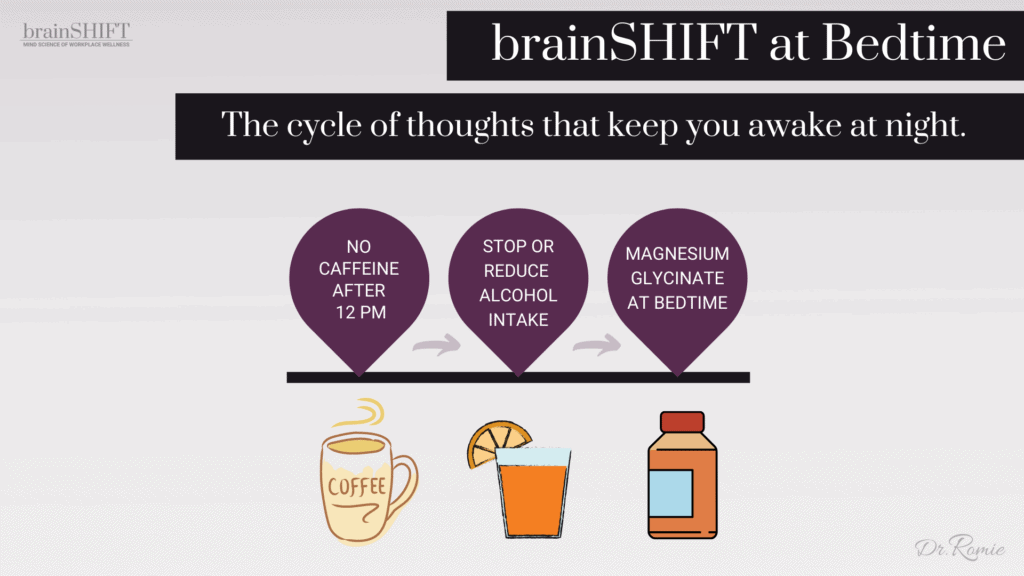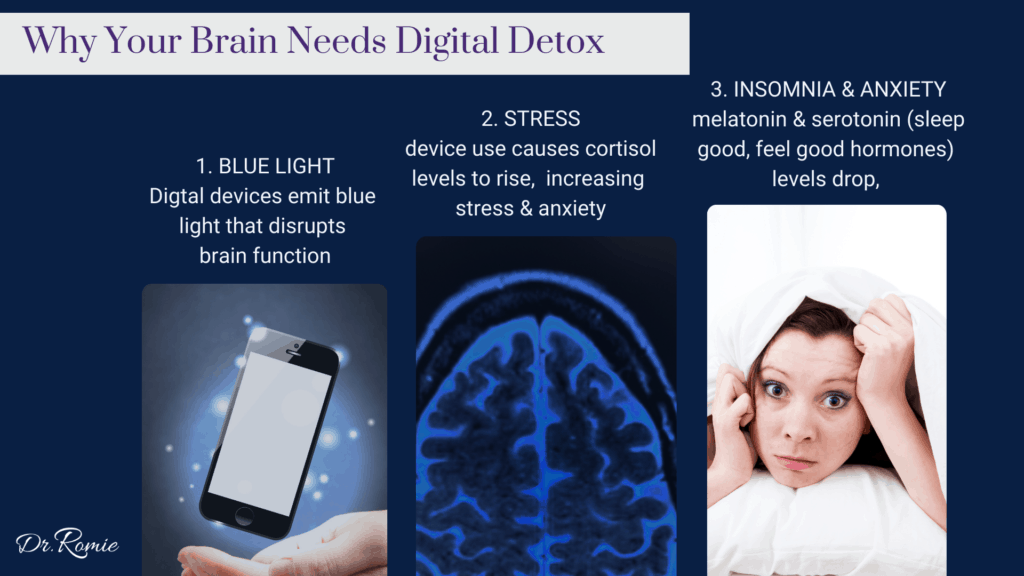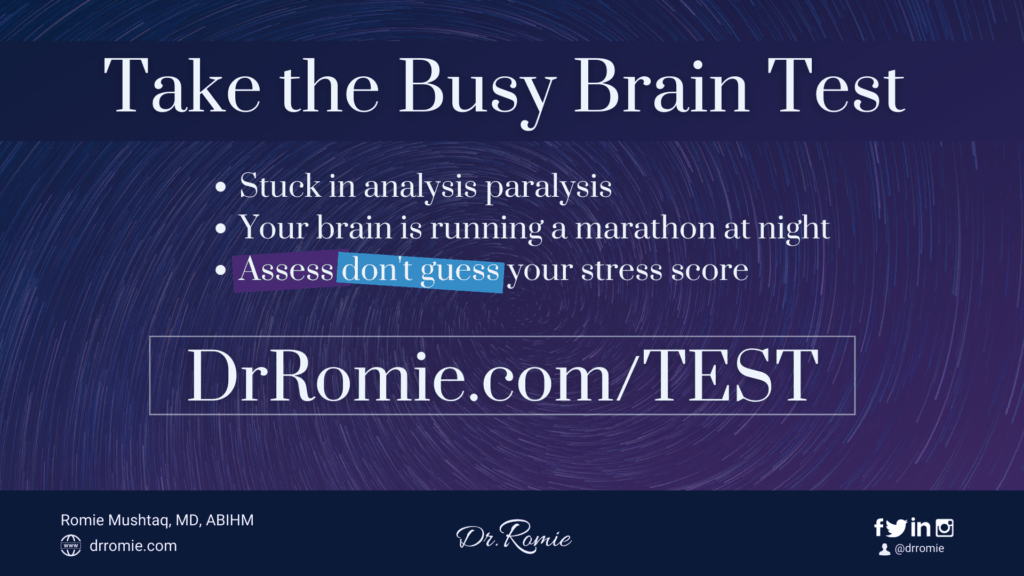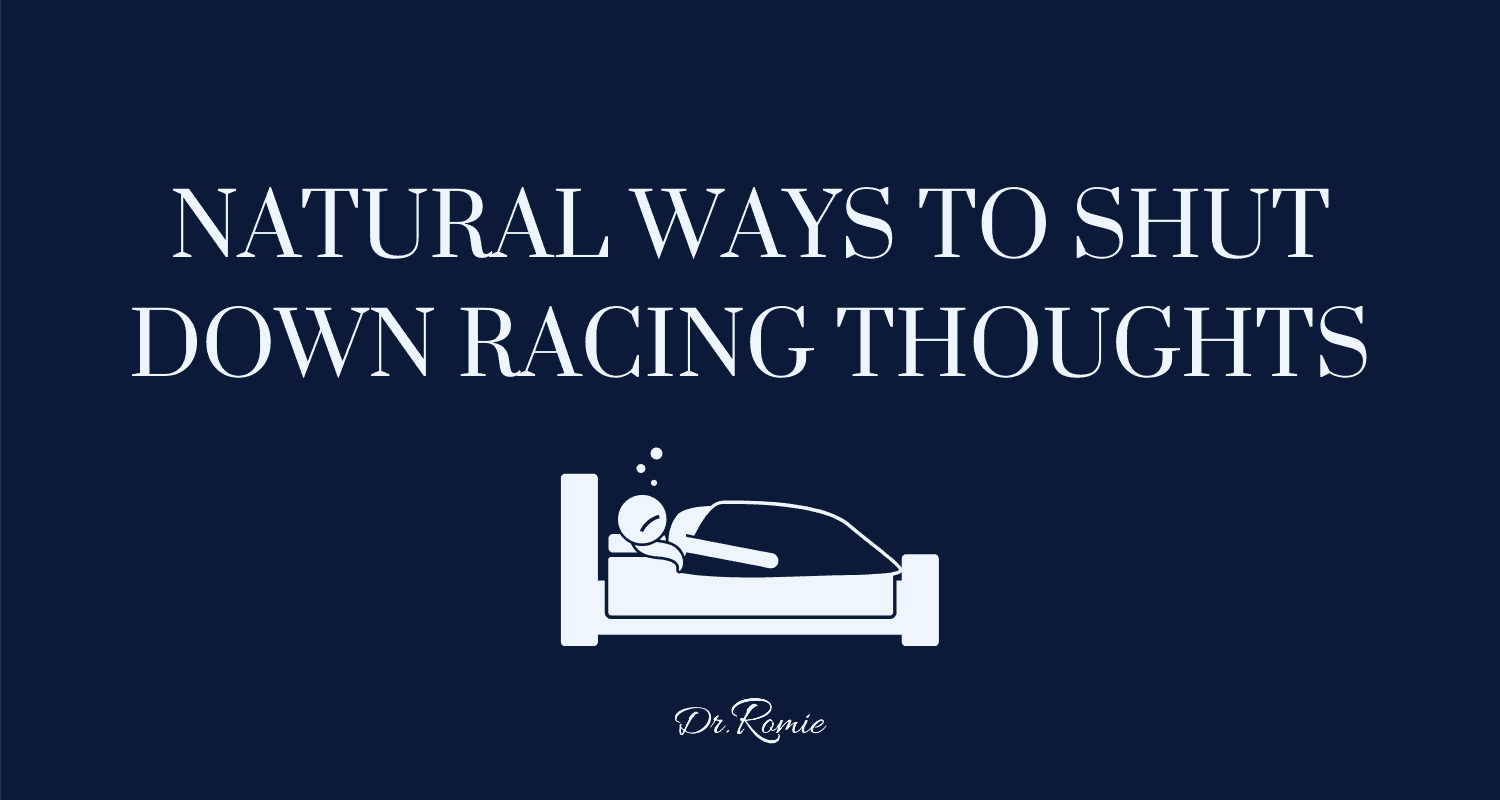“Be the light. See the light, and then turn off all the lights in your bedroom.” #DrRomieRealTalk
Why are our brains busy with thoughts at night?
Racing thoughts at night are due to one type of anxiety known as ruminating anxiety. Ruminating anxiety is common in highly intellectual individuals. This is all of us who are members of the global brainSHIFT crew- unapologetic success-driven professionals who don’t want to be told to slow down.
One of the most frequent causes of these racing thoughts at bedtime is due to digital devices. Using your digital devices and dim lights in the house 30-60 minutes before your bedtime keeps your mind chatter running at full speed.
Lights disrupt our sleep/wake cycle, but it also tells the brain, “wake up!” while stress hormone levels rise. Whether we’re reading work emails, watching a crime show, or trolling & scrolling on Instagram, you are activating your brain and language and emotion centers. Now your brain is signaled to stay awake and start running a marathon. Your sympathetic nervous system has kicked you into a “flight or fright” stage, and now you have turned on your Busy Brain.

Brain Science Explains Racing Thoughts at Bedtime
Do you have a Busy Brain? When we are in a busy brain state, we can find ourselves overthinking or stuck on one random conversation from the day that genuinely should not register as consequential in your life.
Due to high-stress levels, our circadian rhythm is disturbed. The circadian rhythm (also known as our biological clock) governs our sleep-wake cycle. When stress hormones, like cortisol & dopamine, are elevated in the evening we feel more energy and anxiety. In those of us with Busy Brains, this high-stress level can fuel ruminating anxiety. People ruminate for a variety of reasons. According to the American Psychological Association, some common reasons for rumination include:
- the belief that by ruminating, you’ll gain insight into your life or a problem
- having a history of emotional or physical trauma (which is our entire world in a global pandemic)
- facing ongoing stressors that make you feel out of control
Do you have a busy brain? Click here to take the Busy Brain test for free.

The Case for Nightly Digital Detox
The first step is what I call digital detox; removing the distractions. Digital devices create a busy brain from the blue light emitted from phones and computers, the worry we feel about emails, and the electromagnetic frequencies given off from devices.
This is a relatively new phenomenon brought on by this age of digital hyper-connectivity. As we start 2021, reports of insomnia worsen in our population while profits from products promising sound sleep are skyrocketing.
Exposure to electronic stimuli and disrupted sleep is scientifically linked, and sleep problems have many more negative consequences to your Busy Brain. In addition to worsening anxiety, you can also experience difficulty focusing during the day, inability to lose weight, and burnout.
Any form of light, even your bedtime reading lamp signals the brain to stay awake. The blue light emitted from our electronic equipment has been scientifically shown to disturb sleep by suppressing melatonin and serotonin. Melatonin and serotonin are two feel-good and sleep-good hormones.
What Natural Supplements Can Help You Fall Asleep at Night?
When we run the brainSHIFT at Work workplace wellness program, I receive a long list of overpriced supplements from executives. Then the Busy Brain says: “Dr. Romie, if you’re going to hand me one more supplement, ain’t none of them going to work. Just toss them.” Or another popular one I often hear, “Well, let me just pick one at random and see if it helps me to fall asleep.”
Along with the trial and error of over-the-counter supplements and no clear instruction of proper dosage, there is also a common fear of prescription medication and long-term dependency in individuals that seek help with falling asleep.
So, what are the supplements that actually work? I will go over the ones I trust and recommend in this blog post, but keep in mind; not all supplements are created equal. Pinpointing what’s going on in this season you’re in will help determine which supplement may be the best for you
There are several isolated ingredients on the market, I am going to cover the most popular for sleep.
Why Melatonin Does Not Work (&When Melatonin Can Help Sleep)
Melatonin is a natural hormone secreted from the pineal gland in the brain. Melatonin is best used to reset our circadian rhythm (the biological clock responsible for the sleep-wake cycle). Melatonin has been found beneficial in studies to be effective in specific situations.
Melatonin works best when:
- When people are over the age of 50 because melatonin decreases with age.
- A starting dose of 3mg or higher, which should be prescribed and monitored by a physician. ( most over-the-counter melatonin is a fraction of the recommended dose).
- Resetting the biological clock to fall asleep earlier in the evening.
- Help prevent symptoms of jet-lag
Melatonin fails to work effectively in the following situations:
- You are exposed to dim lights or blue lights in the 60 minutes before bedtime. Light depresses melatonin levels.
- Age less than 50
- If you have an anxiety disorder
- Chronic use can cause rebound insomnia.
Magnesium Deficiency
When you’ve been sweating, dehydrated, or if you have any alcohol in the evening, your magnesium levels are depleted. Magnesium is mineral that influences and supports all the chemical reactions in the brain, especially those that calm a Busy Brain. Chronic low magnesium levels can be due to nutritional deficiencies or depletion. Whe magnesium levels are low, serotonin levels also drop or are depleted. (Serotonin is an important neurohormone that governs our mood, memory, and sleep).
Chronic magnesium deficiencies leads to:
- migraine headaches
- worsening PMS symptoms
- anxiety and mood disorders
- insomnia
- worsening depression
- Busy Brain
In these cases, we can measure magnesium levels in the blood or saliva. Using magnesium glycinate can negate this deficiency. Magnesium glycinate is the most gentle formulation to avoid stomach upset; it is also the formulation of magnesium that crossed the blood-brain barrier. In addition to magnesium glycinate, other absorbable forms of magnesium are glucarate, aspartate, or threonate. (Avoid magnesium citrate and oxide they are best used for constipation)
Other Supplements for Sleep
Additional supplements you’ll find on the market, that are very commonly listed as sleep aids, are lavender, chamomile, passionflower, and lemon balm. If you’re going to look for any of these supplements, I tend to recommend them in combination therapy.
I am holding the intention for you to have peaceful sleep.
Let’s brainSHIFT together and tame our Busy Brains,
Dr. Romie
**Before starting any over the counter medications, supplements, or prescription medications, please speak to your physician**

Resources:
- Power off to Plug Into Sleep: Dr. Romie on HuffPost: https://www.huffpost.com/entry/sleep_b_4739107
- Melatonin can cause rebound insomnia: https://pubmed.ncbi.nlm.nih.gov/684426/#:~:text=Rebound%20insomnia%20followed%20the%20withdrawal,the%20action%20of%20these%20drugs
- Rumination in anxiety & depression: https://www.ncbi.nlm.nih.gov/pmc/articles/PMC4116082/

